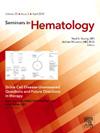在撒哈拉以南非洲实施镰状细胞病最佳管理的当前挑战和新方法。
IF 5
3区 医学
Q1 HEMATOLOGY
引用次数: 2
摘要
镰状细胞病(SCD)是世界上最常见的危及生命的单基因疾病。这种疾病在疟疾流行地区非常流行,超过75%的患者居住在撒哈拉以南非洲(SSA)。据估计,如果没有适当的护理,多达90%的SCD儿童将无法庆祝他们的五岁生日。早期识别和纳入综合护理已被证明可以降低SCD并发症的发病率和死亡率。然而,由于资源限制,SSA尚未实施SCD的新生儿筛查计划。此外,该地区SCD患者的护理受到以下因素的阻碍:缺乏合格的医护人员,缺乏SCD临床管理指南,住院和门诊护理的基础设施有限,以及获得血液和羟基脲等疾病改良药物的机会有限,这些都会导致临床结果不佳。骨髓移植和基因治疗等治疗选择很昂贵,在许多SSA国家都不可用。为了应对这些挑战,SSA正在开展各种举措,旨在提高对SCD的认识,改善患者的识别和护理保留,统一SCD的护理标准,提高医护人员的技能,并在SSA背景下对SCD相关领域进行研究。强化这些措施对于改善SSA SCD的结果至关重要。本文章由计算机程序翻译,如有差异,请以英文原文为准。
Current challenges and new approaches to implementing optimal management of sickle cell disease in sub-Saharan Africa
Sickle cell disease (SCD) is the most common life-threatening monogenic disorder in the world. The disease is highly prevalent in malaria endemic areas with over 75% of patients residing in Sub-Saharan Africa (SSA). It is estimated that, without proper care, up to 90% of children with SCD will not celebrate their fifth birthday. Early identification and enrolment into comprehensive care has been shown to reduce the morbidity and mortality related with SCD complications. However, due to resource constraints, the SSA is yet to implement universal newborn screening programs for SCD. Furthermore, care for patients with SCD in the region is hampered by the shortage of qualified healthcare workers, lack of guidelines for the clinical management of SCD, limited infrastructure for inpatient and outpatient care, and limited access to blood and disease modifying drugs such as Hydroxyurea which contribute to poor clinical outcomes. Curative options such as bone marrow transplant and gene therapy are expensive and not available in many SSA countries. In addressing these challenges, various initiatives are ongoing in SSA which aim to enhance awareness on SCD, improve patient identification and retention to care, harmonize the standards of care for SCD, improve the skills of healthcare workers and conduct research on pertinent areas in SCD in the SSA context. Fortifying these measures is paramount to improving the outcomes of SCD in SSA.
求助全文
通过发布文献求助,成功后即可免费获取论文全文。
去求助
来源期刊

Seminars in hematology
医学-血液学
CiteScore
6.20
自引率
2.80%
发文量
30
审稿时长
35 days
期刊介绍:
Seminars in Hematology aims to present subjects of current importance in clinical hematology, including related areas of oncology, hematopathology, and blood banking. The journal''s unique issue structure allows for a multi-faceted overview of a single topic via a curated selection of review articles, while also offering a variety of articles that present dynamic and front-line material immediately influencing the field. Seminars in Hematology is devoted to making the important and current work accessible, comprehensible, and valuable to the practicing physician, young investigator, clinical practitioners, and internists/paediatricians with strong interests in blood diseases. Seminars in Hematology publishes original research, reviews, short communications and mini- reviews.
 求助内容:
求助内容: 应助结果提醒方式:
应助结果提醒方式:


